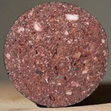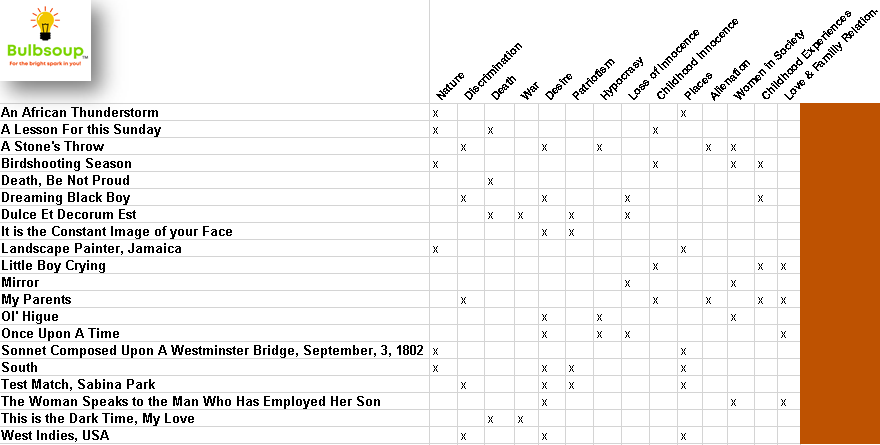Sentry Page Protection
O'L HIGUE
|
|
Mark McWatt was born in Guyana. He was the founding editor, in 1986, of the Journal of West Indian Literature and published three collections of poetry, the second of which, The Language of Eldorado (1994), was awarded the Guyana Prize.(more)
|
LITERAL MEANING
In this poem, the Ol' Higue / soucouyant tells of her frustration with her lifestyle. She does not like the fact that she sometimes has to parade around, in the form of a fireball, without her skin at night. She explains that she has to do this to scare people, as well as to acquire baby blood. She explains that she would rather acquire this blood via cooked food, like everyone else. Her worst complaint is the pain of salt, as well as having to count rice grains. She exhibits (www.bulbsoup.com) some regret for her lifestyle but implies that she cannot resist a baby's smell, as well as its pure blood. The 'newness' of the baby tempts Ol' Higue, and she cannot resist because she is an old woman who fears death, which can only be avoided by consuming the baby's blood. She affirms her usefulness in the scheme of things, however, by claiming that she provides mothers with a name for their fears (this being the death of a child), as well as someone to blame when the evil that they wish for their child, in moments of tired frustration, is realized. She implies that she will never die, so long as women keep having babies.
In this poem, the Ol' Higue / soucouyant tells of her frustration with her lifestyle. She does not like the fact that she sometimes has to parade around, in the form of a fireball, without her skin at night. She explains that she has to do this to scare people, as well as to acquire baby blood. She explains that she would rather acquire this blood via cooked food, like everyone else. Her worst complaint is the pain of salt, as well as having to count rice grains. She exhibits (www.bulbsoup.com) some regret for her lifestyle but implies that she cannot resist a baby's smell, as well as its pure blood. The 'newness' of the baby tempts Ol' Higue, and she cannot resist because she is an old woman who fears death, which can only be avoided by consuming the baby's blood. She affirms her usefulness in the scheme of things, however, by claiming that she provides mothers with a name for their fears (this being the death of a child), as well as someone to blame when the evil that they wish for their child, in moments of tired frustration, is realized. She implies that she will never die, so long as women keep having babies.
|
You think I like this 5. stupidness! -
6. gallivanting all night without skin, 1. burning myself out like cane-fire 2. to frighten the foolish? 5 2. And for what? A few drops of baby blood? 2. You think I wouldn't rather take my blood seasoned in fat black-pudding, like everyone else? And don't even talk 'bout the pain of salt 10 and having to bend these old bones down to count a thousand grains of rice! If only babies didn't smell so nice! And if I could only stop hearing 3. the soft, soft call 15 of that 7. pure blood running in new veins, 4. singing the sweet song of life tempting an old, dry-up woman who been 8. holding her final note for years and years, afraid of the dying hum ... 20 Then again, if I didn't fly and come to that 9. fresh pulse in the middle of the night, 2. how would you, mother, name your ancient dread? 2. And who to blame for the murder inside your head ...? 25 Believe me - As long as it have women giving birth a poor ol' higue like me can never dead. Poet: Mark McWatt |
LITERARY DEVICES
1. SIMILE
|
scapegoat if something unfortunate happens to the child. The mother is relieved of bearing the burden of guilt.
3. REPETITION
3. REPETITION
- Stanza 2, line 14: The repetition of the word 'soft' emphasizes the fact that the call of the child's blood has captured and beguiled the Ol' Higue'. She implies that she cannot resist that call.
- Stanza 2, line 16: This device emphasizes Ol' Higue's dependence, even addiction, to the sweet blood of the baby.
IMPORTANT WORDS/ PHRASES
5. 'stupidness!' (Stanza 1, line 1)
This is a distinctly Caribbean phrase that highlights frustration or scorn. Therefore, it highlights Ol' Higue's frustration with her lack of self-control.
6. 'gallivanting' (Stanza 1, line 2)
This term refers to someone 'playing around', having fun. The Ol' Higue is being sarcastic at this point. She is expressing displeasure at having to fly around to seek prey.
7. 'pure blood running in new veins' (Stanza 2, line 5)
Babies are often associated with purity, this is what is emphasized here. The Ol' Higue simply cannot resist the lure of new and pure blood.
8. 'holding her final note for years and years, afraid of the dying hum ...' (Stanza 2, lines 18-19)
This tells us that the Ol'Higue has been living (www.bulbsoup.com) this desperate existence for a long time. It also implies that she will keep hanging on, despite her frustration. The final line confirms this point: 'As long as it have women giving birth a poor Ol' Higue like me can never dead'
5. 'stupidness!' (Stanza 1, line 1)
This is a distinctly Caribbean phrase that highlights frustration or scorn. Therefore, it highlights Ol' Higue's frustration with her lack of self-control.
6. 'gallivanting' (Stanza 1, line 2)
This term refers to someone 'playing around', having fun. The Ol' Higue is being sarcastic at this point. She is expressing displeasure at having to fly around to seek prey.
7. 'pure blood running in new veins' (Stanza 2, line 5)
Babies are often associated with purity, this is what is emphasized here. The Ol' Higue simply cannot resist the lure of new and pure blood.
8. 'holding her final note for years and years, afraid of the dying hum ...' (Stanza 2, lines 18-19)
This tells us that the Ol'Higue has been living (www.bulbsoup.com) this desperate existence for a long time. It also implies that she will keep hanging on, despite her frustration. The final line confirms this point: 'As long as it have women giving birth a poor Ol' Higue like me can never dead'
THEMATIC CATEGORIZATION: Desire, Hypocrisy, Women in Society
ATMOSPHERE
The mood of the poem is acceptance and annoyance.
The tone of the poem is slightly bitter and resigned. She accepts that the cycle of her life cannot change.
The mood of the poem is acceptance and annoyance.
The tone of the poem is slightly bitter and resigned. She accepts that the cycle of her life cannot change.
Contributor: Leisa Samuels-Thomas
McWatt, M. 'O'l Higue' in A World of Poetry. Edited by Mark McWatt and Hazel Simmonds McDonald. Pearson Education Ltd, 2005.
McWatt, M. 'O'l Higue' in A World of Poetry. Edited by Mark McWatt and Hazel Simmonds McDonald. Pearson Education Ltd, 2005.






